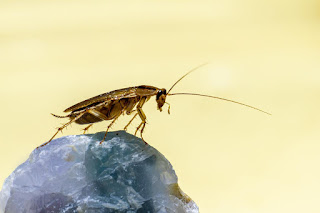A new article recently revealed that an AI laser capable of identifying and zapping cockroaches has been developed.
According to a paper published on September 21 in the journal Oriental Insects, this laser marks a new method of pest control, with the ability to kill individual bugs from a distance of up to four feet away without the use of harmful pesticides.
"In this study, we are presenting an automated machine vision laser system to neutralize and influence the behaviour of insect pests," the authors write. "By performing experiments on domiciliary cockroaches, Blattella germanica, we demonstrate that our approach enables the immediate and selective neutralization of individual insects at a distance up to 1.2 m [4 feet]."
Image by Erik Karits from Pixabay
Cockroaches are a major pest in the world, eating and contaminating food and crops for humans and animals, and leaving an unpleasant scent in houses. According to 2021 census data in the United States, 14 million of the roughly 124 million occupied housing units in the United States reported seeing cockroaches in their living space the year before.
"Pest control is a major issue for the food industry and public health. Current agrochemical practices for controlling harmful insects are generally problematic because they lead to resistance and often impact non-targeted species," wrote paper's authors.
Methods for controlling cockroach infestation include the use of poisonous baits containing hydramethylnon or fipronil and boric acid powder, as well as insecticides containing deltamethrin or pyrethrin. However, these methods are harmful to companion animals, humans and pollinators such as bees. Cockroaches can even build up chemical resistance over time.
As a result, this pest control laser could be a method to control future cockroach infestations without the use of harmful chemicals. This is a particularly pressing problem in the years ahead with the pervasive impacts of climate change. As a result of rising global temperatures and changing demographic dynamics, it is expected that pests will become a much larger problem, especially in agriculture.
Warmer temperatures can increase the physiologic activity and metabolic rate of insects, causing pests to eat more crops. climate change will cause the distribution of crops and pests to move to places that may not have their usual predators, leading to a population boom.
The authors hope that their laser pest removal system could be a way of eliminating insects without killing important species.
"Parameters of our prototype system can readily be tuned for applications in various situations and on different pest species like mosquitoes, locusts, and caterpillars. The prospect of this study is to pursue the creation of a standalone, safe for the environment, compact, low-cost, and energy-efficient device system for pest control," the authors wrote.
The device itself functions by using artificial intelligence, or AI, to detect and recognize the cockroach using a camera, before shooting a laser at it, killing it. Researchers trained AI to understand what a cockroach looked like under a variety of light conditions and positions.
"We used 1,000 images that were prepared with different lighting to make the research more effective at any time of the day," wrote the authors.
This method of pest management has its drawbacks and dangers, however, because of the use of a laser powerful enough to kill the insect.
"It is very important to note that the usage of this device must be restricted to areas where the possibility of the laser beam hitting another non-targeted living specimen is minimized," the authors wrote. "The aim of this work is to demonstrate the feasibility of using a laser to control insect pests, but we also understand that there exist safety issues of using lasers in insect control processes and they would require further study."
Laser beams can seriously damage the eyes, which means that if this device were used in a house, it would be dangerous to adults, children and pets.
"It's not recommended because it's a little dangerous," Ildar Rakhmatulin, a research associate at Heriot-Watt University and lead author of the paper, told Vice. "Lasers can damage not only cockroaches but your eyes."
Lasers can damage the cornea, lens, or retina, depending on the wavelength, as they burn the tissues. As the authors, a laser can also penetrate a blood vessel and clog it, or even hit a point where the nerves in the whole eye go to the brain.













